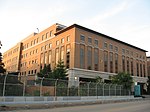Victoria Hall (Pittsburgh)
City of Pittsburgh historic designationsHouses completed in 1870Houses in PittsburghPittsburgh History & Landmarks Foundation Historic LandmarksSecond Empire architecture in Pennsylvania

Victoria Hall (also known as Ursuline Academy, as well as the Lynch House) at 201 South Winebiddle Street in the Bloomfield neighborhood of Pittsburgh, Pennsylvania, was built for Henry J. Lynch in the late 1860s. It was acquired by the Ursuline Sisters in 1894 and used as a Catholic girls' school, the Ursuline Academy for Young Women from 1895 to 1981. The school building was listed on the National Register of Historic Places in 2012.
Excerpt from the Wikipedia article Victoria Hall (Pittsburgh) (License: CC BY-SA 3.0, Authors, Images).Victoria Hall (Pittsburgh)
Coral Street, Pittsburgh
Geographical coordinates (GPS) Address Nearby Places Show on map
Geographical coordinates (GPS)
| Latitude | Longitude |
|---|---|
| N 40.464077777778 ° | E -79.94235 ° |
Address
Unity Center of Pittsburgh
Coral Street
15224 Pittsburgh
Pennsylvania, United States
Open on Google Maps










